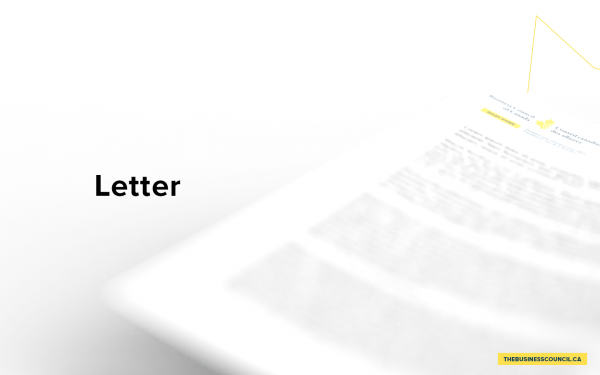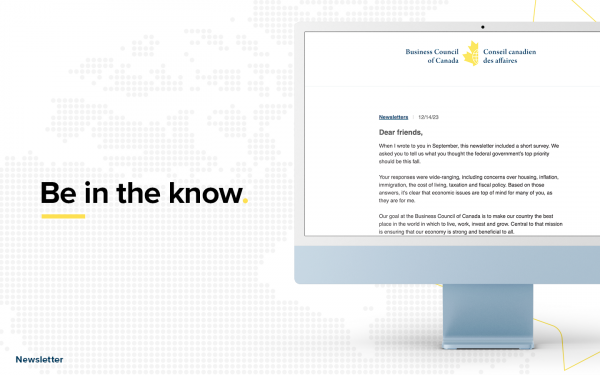Canada slips in latest competitiveness ranking
The new government’s Speech from the Throne on December 5th offers an opportunity to lay out a vision for Canada’s future. Last month, the World Economic Forum (WEF) released the newest edition of the Global Competitiveness Index, which should serve as a motivator for the challenges Canada needs to address.
Since the last competitiveness index report a year ago, Canada has fallen two spots to 14th in the world—we’ve been leapfrogged by South Korea and Taiwan.
Why is this significant? Because economic competitiveness is critical to our prosperity and fuels our Canadian way of life.
A competitive economy is a necessary precondition to addressing inequality and raising living standards for all Canadians, which aligns with core Canadian values. A competitive economy also makes Canada more impactful on the global stage, in political, economic and social terms. We all have to play a role, corporate Canada and the government, to make Canada more competitive. Failure to do so will render other social policies ineffectual or even worse, regressive and divisive, geographically across Canada. Put another way, a “smaller pie” will create social, economic and political strains that are detrimental for all.
Global Competitiveness Index: Top 20

I believe the issues raised in this year’s report identify the focus areas for government and business leaders in Canada. There are three priorities in particular that I believe the government must address as a start in the new Speech from the Throne.
First and perhaps most concerning is our performance in the technology and innovation sector. The WEF ranks Canada 35th in the world in information and communications technology adoption, putting us significantly behind top performers like Hong Kong (3rd), and Denmark (9th). We lag in critical measures like mobile broadband infrastructure and usage, R&D investments, and digital collaboration between companies, universities, and research centers – measures that have the potential to meaningfully improve and sustain the Canadian way of life in areas like health and education services. The challenges are compounded by a looming shortage of talent in the sector, as I wrote about earlier this month.
A second critical area for improvement is Canada’s infrastructure deficit. Support for infrastructure is a long-term investment in our country’s future, and must be a top priority. The government has made significant commitments to infrastructure, but to date has struggled to get shovels in the ground. As of today, Canada is falling behind, ranking only 26th in the world on infrastructure renewal in the WEF’s report. By comparison, Singapore ranks best in the world on this measure; as well as, best in the world in the overall ranking, reflecting the central importance of infrastructure as a foundation for competitiveness. With a new Throne Speech, the government has a real opportunity to assert its commitment to breaking ground, literally, and starting new projects immediately that will inspire Canada to address this critical infrastructure deficit.
Finally, a third area for focus should be Canada’s economic resilience. The WEF currently ranks us first in the world in macroeconomic stability, but there are serious risks to our economic outlook. We are dependent on trade in an era when global trade tensions are on the rise. We are also vulnerable to fluctuations in commodity prices, as recent experience demonstrates. And the government has a structural deficit that is expected to remain in place until 2040, which limits our room to manoeuver in the event of economic headwinds. Notwithstanding the new minority parliament, the government again has a real opportunity to emphasize a long-term economic strategy to “grow the pie.”
The good news from the report is that Canada continues to have core advantages that stand out on the world stage. Canada boasts one of the most highly-educated workforces in the world, and we are one of the top destinations for highly-skilled and educated immigrants. These combine to make talent Canada’s greatest competitive advantage, as we highlighted at Deloitte in our competitiveness scorecard earlier this year. We also have some of the strongest institutions in the world and a competitive financial system, helping Canadian banks to be resilient and creating confidence for international market participants.
These advantages provide a promising foundation on which to build. And I know from my own conversations with leaders in business and government that Canadians are increasingly becoming alert to the challenges we face. But we need to translate awareness of, and talking about, the issues, to commitments and actions.
The WEF report is a reminder: Our competitiveness is at risk, and Canada must be courageous and do what is right. Working together, I am confident that Canada can maintain its position as the best place to live and work in the world for years to come.









